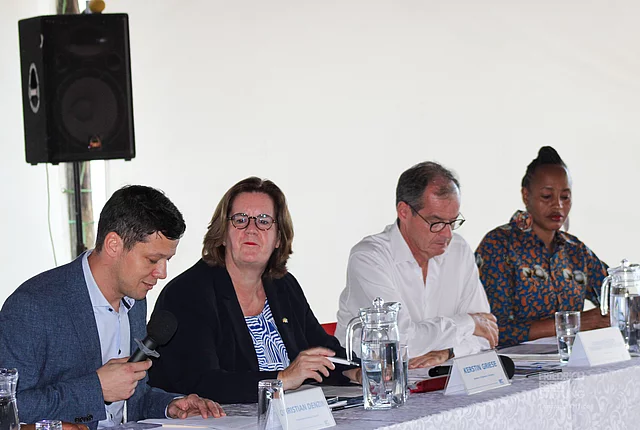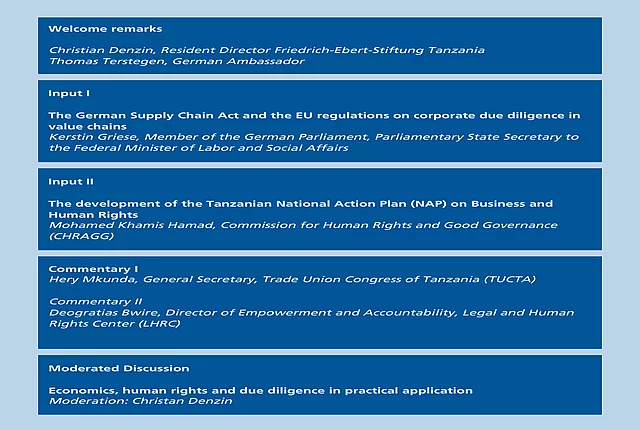- Event |
- Publication
Political Roundtable on Business and Human Rights: Discussing the German Supply Chain Law and EU Directive
Friedrich-Ebert-Stiftung (FES) Tanzania recently hosted a high-level political roundtable focused on business and human rights. The event centered around discussions on the implications of the German Supply Chain Law (LKSG) and the European Directive on Corporate Due Diligence in Supply Chains. These legislative efforts mark a significant shift in corporate responsibility, moving from voluntary commitments to enforceable legal obligations, particularly concerning human rights and environmental protection in global supply chains.
The roundtable brought together a German delegation, including Parliamentary State Secretary Kerstin Griese from the German Ministry for Labour and Social Affairs (BMAS), Katja Mast, First Parliamentary Secretary of the SPD parliamentary group, and Dagmar Schmidt, Deputy Chair of the SPD Parliamentary Group. Also present were Tanzanian trade union leaders and representatives of the governmental Commission of Human Rights and Good Governance (CHRAGG).
A Shift Toward Legal Obligations
Both the German Supply Chain Law and the EU Directive represent a major step toward implementing the United Nations Guiding Principles on Business and Human Rights. They aim to shift the corporate landscape by creating legal obligations for businesses to assess and mitigate risks related to human rights violations and environmental damage. Kerstin Griese remarked that this shift, while significant, is a "duty to try" rather than a definitive "duty to succeed," underlining the complexity of addressing these challenges.
The roundtable acknowledged the pioneering nature of the EU’s and Germany’s legislative efforts, which may lead to a "race to the top" in setting global standards for corporate accountability.
Tanzanian Perspectives and Progress
CHRAGG representatives, including Vice Chairperson Hon. Mohamed Khamis Hamad, welcomed the insights from Germany’s experience. Hamad emphasized that sustainable development in Tanzania cannot be achieved if businesses continue to violate human rights. His remarks reflected CHRAGG’s ongoing efforts to develop Tanzania’s National Action Plan (NAP) on Business and Human Rights, which has been under discussion since 2022.
The Tanzanian NAP, much like Germany’s LKSG, includes mechanisms for law enforcement. Hamad pointed out that under Article 391 of the CHRAGG Act, recommendations must be implemented within 90 days, providing a concrete timeline for compliance.
Global Collaboration and Union Involvement
A key theme in the discussions was the need for a global framework to create a level playing field for companies worldwide. Katja Mast stressed that the success of these laws depends on partnerships with countries in the Global South, such as Tanzania.
Trade union representatives, including TUCTA Secretary General Hery Mkunda, expressed support for Germany’s and the EU’s efforts but highlighted the need for more knowledge about the laws, their mechanisms, and implementation processes. One of the key recommendations from the roundtable was to bridge the knowledge gap in the Global South on review and reporting mechanisms, such as the role of Germany’s Federal Office of Economics and Export Control (Bafa).
The German delegation emphasized the crucial role that trade unions played in supporting the development of similar legislation in Germany, suggesting that Tanzanian unions could play a similar role in shaping the country’s business and human rights policies.
The roundtable highlighted the importance of collaboration between nations, trade unions, and governmental bodies in addressing human rights and environmental issues in global supply chains. As Tanzania continues to develop its NAP, lessons from Germany’s experience with the LKSG and the EU’s directives offer valuable insights.
Public Engagement and Media Coverage
The roundtable’s discussions were made public, with media coverage amplifying the event's significance in national news. This transparency underscored the importance of CHRAGG being open in its next steps toward finalizing Tanzania’s NAP. Unfortunately, Tanzanian representatives noted that public interest in the development of the NAP has so far been limited.
Roundtable Program Overview
View Photos

